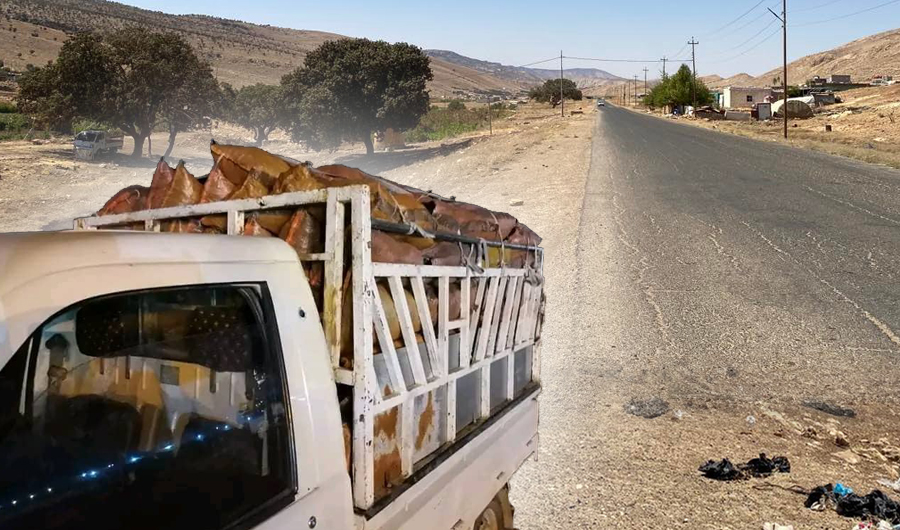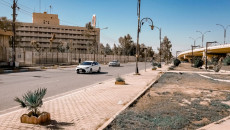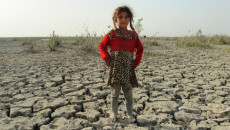The local administration of Sinjar District, west of Ninewa province, expressed its concern about the aggravation of the phenomenon of logging in Mount Shingal, including perennial trees, which prompted security forces to launch a campaign to arrest those involved in cutting down those trees, and imposed a fine of 50,000 dinars on the violator.
According to unofficial statistics by the Shingal administration, nearly 4,000 trees have been cut down since last year, and the process is ongoing.
Fahad Hamed, the mayor of Shingal, told (KirkukNow), "The people who cut down these trees are Shingal natives. We do not have a problem with cutting dry trees for any purpose, but cutting green trees is a red line."
He stressed they informed all security agencies to monitor and prevent such cases and take the necessary steps.
"The police arrested a number of people and were referred to the court in order to punish them according to the law."
People chop down trees to turn it into charcoal and then sell it
People chop down trees to turn it into charcoal and then sell it, the mayor explained.
According to Articles 479 and 480 of the Iraqi Penal Code, whoever uproots, cuts down or damages a tree without the approval of the concerned authorities shall be punished by imprisonment for a period not exceeding two years and a fine or one of the two penalties.
Shingal, located 120 west of Mosul, centre of Ninewa province, on the border of Iraq-Syria, is home to the Ezidi religious minority considered by the so-called Islamic State ISIS as infidels. It's one of the disputed territories between Baghdad and Erbil.
Over 550,000 Ezidis were living in Iraq before ISIS taking control of one third of Iraqi territories in August 2014 up to October 2017. About 350,000 Ezidis were displaced, only one third of them are back to Shingal due to instability, poor public services and living conditions and unemployment among the war-torn Ezidi community.
An official source in Shingal Police anonymously told (KirkukNow), "The issue of logging in Mount Shingal is not new, but it has recently sparked a wave of protests on social networks."
"On the night of September 15, our detachments at a checkpoint outside Shingal confiscated a vehicle loaded with 300 bags of charcoal, and on the same night another vehicle carrying 30 bags of charcoal was confiscated."
Shingal police arrested four people in both vehicles, and they are to be referred to Ninewa Court.
According to Article 22 of the Forestry Law No. 30 of 2009, "A fine of fifty thousand dinars (USD30) shall be imposed on anyone who cuts down a tree from the state and public sector forests or artificial trees.”
As stated in the Iraqi Environmental Protection and Improvement Law No. 27 of 2009, “The violator of the provisions of the law, regulations, instructions and statements issued pursuant thereto shall be punished by imprisonment for a period of no less than three months and/or a fine of not less than one million dinars and not more than twenty million dinars.”
Mount Shingal is located in the west of Ninewa Province, which is a vast area on the border between Iraq and Syria, home to thousands of olive trees, some of which are several decades old.
On September 17, Ezidikhan Asayish, affiliated to Kurdistan Workers party which is fighting Turkey and holding territories in Iraqi Kurdistan region and the disputed territories, who are responsible for the security file of a section of Shingal district, published a statement in which they threatened to punish people who cut trees and stressed the imposition of a fine of 50,000 dinars on violators.
Khodida Alias, in charge of the pro-PKK Autonomous Administration Council in Sinuny subdistrict, told (KirkukNow), "Since last year, 4,000 trees have been cut down, and to reduce this phenomenon, the Ezidikhan Asayish (security) forces have set up several military points to monitor the areas of Mount Shingal, and we will impose the harshest punishment on violators.”
He stressed that "most of the trees near the main roads have been cut down. If all parties do not cooperate with us, and if the situation continues at this pace, we will face an environmental disaster."







